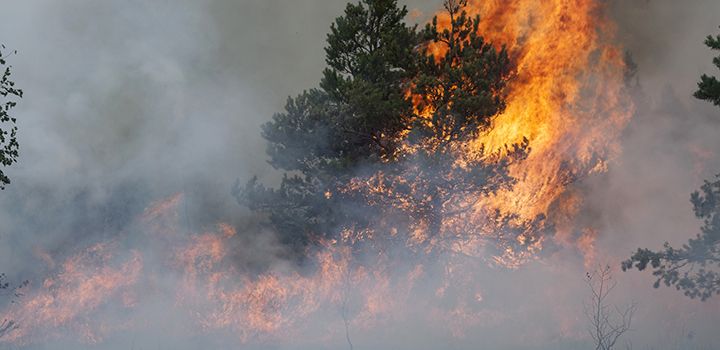Report reveals cautionary tale of forests falling victim to “Humpty Dumpty effect”
By: Communications

A global report on the role of forests in providing economic and social resilience has revealed that the rapid pursuit of economic growth, coupled with a critical misunderstanding of how forests contribute to social and economic resilience, has set a path for undoable destruction – with researchers dubbing this “The Humpty Dumpty Effect”.
Research involving the University of East Anglia shows that forests are at risk of being pushed to the brink of collapse, which could send ripple effects across the globe, destabilising societies, wellbeing and economies, and just as the nursery rhyme warns, collapsed systems cannot be ‘put back together again’. Much better to preserve resilient forest systems.
Launched today on World Environment Day, the report is the first of its kind and involved leading scientists convened by the International Union of Forest Research Organizations (IUFRO), including Dr Rachel Carmenta from the Tyndall Centre for Climate Change Research and School of Global Development at UEA.
They have explored, for the first time globally, how forests contribute to social and economic resilience, and how they do so in the face of disturbance and change, as well as how societies can, in turn, support and steward resilient forest systems.
New recognition needed for forests
The scientists are calling on policymakers to abandon business as usual and recognise that forests are not isolated systems, but instead exist as social-ecological systems (SES).
In this vein, the world’s forests are not immune to global regime shifts. As political polarisation grows, climate change is becoming deprioritised and markets are shifting in response, and changing the way in which we rely on, manage, and protect our forests.
IUFRO scientists warn that by failing to uphold forest resilience, we risk pushing them beyond the point of recovery and in so doing jeopardize their multiple contributions to social systems.
Dr Carmenta, Coordinating Lead Author on the report, said: “Maintaining the resilience of forest systems is challenging because disproportionately powerful drivers linked to capital accumulation lead to their degradation and the multiple values of forests are not well-recognized by many decision makers.
“Interventions to protect or enhance forest resilience must be beyond the site-level, capable of influencing the distant, often wealth-related drivers of deforestation and degradation. More can be done to uphold, empower and enhance the contributions of forest stewards. We have developed Connected Conservation, a new form of conservation better suited to the hyper-connected reality of our times.”
Dr Craig Allen from the University of Nebraska–Lincoln is Chair of the Global Expert Panel on Forests for Social and Economic Resilience. He said: “It’s not just the trees that fall - it’s a whole web of relationships between species, soil, water, and people that unravels. Once disrupted, these relationships can’t simply be ‘replanted’. We need proactive resilience building now, rooted in science, justice and long-term thinking."
Interconnected world
Indigenous Peoples and local communities have long been championed as the custodians of our forests, often disproportionately impacted by the onset of climate change. Whilst this is true, the report highlights that policymakers underestimate the growing ways in which our world is interconnected.
Dr Nelson Grima, Coordinator of the Science-Policy Programme at IUFRO, said: “When we destabilise forests, the impacts can be felt across all regions and economies. Forests are everyone’s business - not just those living nearby. Every person relies on forests to either regulate their climate, sequester carbon, or to alleviate poverty, ensure food and clean water or to keep economies stable. It’s not about proximity.”
IUFRO’s report recommends how policymakers can improve and better understand how forests uphold social and economic resilience in ways that acknowledge the world's interconnectedness. Economic prosperity cannot be considered synonymous with improving the resilience of social-ecological systems, in fact, it’s often quite the contrary.
On World Environment Day IUFRO is calling on policymakers and decision-makers to transform their understanding of the challenges and solutions our forests face, and to move from reactive, short-term, siloed decision-making to long-term, proactive, systems-based approaches that treat forests as part of our social, economic, and environmental fabric.
Study in the School of Global Development
Related Articles

Global CO2 emissions from forest fires increase by 60 per cent
A major new study reveals that carbon dioxide (CO2) emissions from forest fires have surged by 60% globally since 2001, and almost tripled in some of the most climate-sensitive northern boreal forests.
Read more
Increase in wildfires in the Brazilian Amazon masks progress on forest protection
New research shows that Brazil achieved “positive environmental strides” in the Amazon in 2023, with the number of deforestation fires at a five-year low.
Read more
Lightning identified as the leading cause of wildfires in boreal forests, threatening carbon storage
Lightning is the dominant cause of wildfire ignition in boreal forests – areas of global importance for carbon storage – and will increase in frequency with climate change, according to new research.
Read more